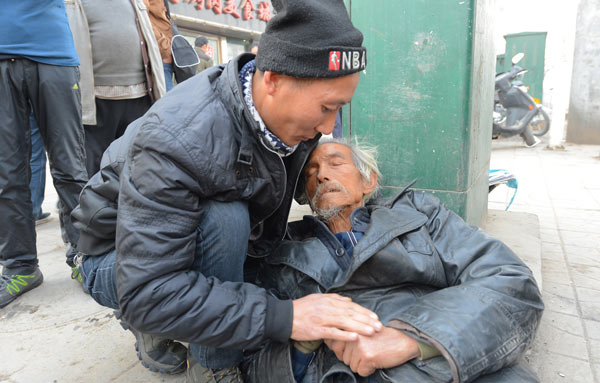

 |
|
A Lanzhou resident surnamed Li helps an elderly man who was hit by a car in the capital of Gansu province on Nov 25. Li tried to contact the man's family, but could not reach them. The man was later sent to a senior citizens' home. PEI QIANG / FOR CHINA DAILY |
Lu Xi, 32, an office clerk in Beijing, tried to explain to her 4-year-old daughter why sometimes it is not a good idea to extend a helping hand to an elderly person who falls over on the street.
"She knows from what she's learned in kindergarten that it's a virtue to help the elderly. But reports of some recent cases where those who offered their assistance found themselves in trouble have given me second thoughts," said Lu.
She is among an increasing number of Chinese people who have found it hard to offer help to others when the need arises.
On June 15, an elderly woman in Dazhou, Sichuan province, fell over in the street and broke her leg. Three primary school students managed to help her up, but she then accused them of having knocked her down and asked their families to pay 20,000 yuan ($3,290) toward medical fees.
Jiang Zhiyun, the father of one of the children, reported the case to the police in November. A police investigation found that the old woman had lied, and she was sentenced to seven days of administrative detention for extortion. Her son, who was also involved in the case, was given 10 days of detention and fined 500 yuan.
According to a recent poll of 139,000 people conducted by China Youth Daily, more than 80 percent of respondents said they would hesitate to help an elderly person who has fallen over, saying they feared getting into trouble or being sued.
More than half said they would rather walk away from the scene, while only 5.4 percent of respondents said they would help without hesitation.
According to some experts, the survey results do not point to moral degeneration in the country but to the substandard system of medical insurance for elderly people.
Guo Ping, deputy director of the China Research Center on Aging, said that some old people had chosen to extort money from those who had helped them in order to pay for high medical fees.
"Under the current medical insurance system, old people, especially those in rural areas, can get a small proportion of their medical bills reimbursed after hurting themselves in an accident, and the application procedure is complicated and can take a long time," Guo told China Daily on Tuesday.
"The refund usually is not enough to fully cover the medical costs."
According to Zheng Lu, associate professor of sociology at Tsinghua University, medical insurance policies differ from province to province, but there is no system of full reimbursement for accidental injury for people older than 65.
"It's a heavy burden for the family. If our public insurance system could increase the refunds for such injuries and if the application process were made easier, I think old people wouldn't resort to extorting innocent people who help them," said Zheng.
However, Yu Hai, sociology researcher at Fudan University, calls for tougher penalties for those who extort money.
"I don't see the link between these cases and the problems in our insurance system. It's just a matter of bad morality," Yu said.
"Most people hesitate to help because they have heard of similar cases where those who help get into trouble. So it's important to punish the cheaters."
Yu suggests people should call somebody to act as a witness or collect evidence by taking photos of the scene before offering help.
Meanwhile, warmhearted people, when offering first aid, should proceed with caution because moving an elderly person who has fallen over might cause secondary injuries.
"It's not a smart move to get an elderly person up quickly after he has fallen because it will possibly cause damage to his bones and joints," said Lin Xiaoling, a nurse at a nursing home in Tianjin.